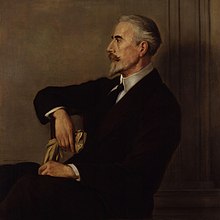Wickham Steed
This article needs additional citations for verification. (May 2015) |
Henry Wickham Steed | |
|---|---|
 Wickham Steed in 1920 | |
| Born | Henry Wickham Steed 10 October 1871 Long Melford, Suffolk, England |
| Died | 13 January 1956 (aged 84) Wootton, England |
| Occupation(s) | Journalist, editor, and historian |
Henry Wickham Steed (10 October 1871 – 13 January 1956) was an English journalist and historian. He was editor of The Times from 1919 to 1922.
Early life
Born in Long Melford, England, Steed was educated at Sudbury Grammar School and the universities of Jena, Berlin and Paris. While in Europe, he demonstrated an early interest in social democracy and met with a range of left-wing figures, including Friedrich Engels, Wilhelm Liebknecht, August Bebel, and Alexandre Millerand. His encounters formed the basis of his first book, The Socialist and Labour Movement in England, Germany & France (1894).[citation needed]
Foreign correspondent
Appointed by
Seen as a leading expert on Eastern Europe, Steed's views had much influence with decision-makers such as high-level bureaucrats and Cabinet politicians in the
Editor of The Times
When the editor of The Times, Geoffrey Dawson, resigned from his post in February 1919, Steed was Northcliffe's first choice to succeed him. Steed had worked closely with Northcliffe during the war, becoming an adviser to him on foreign affairs. Steed was forced to contend with Northcliffe throughout most of his tenure as editor, as the press baron retained considerable control over the affairs of the newspaper.[citation needed]
After the war, Steed strongly disapproved of the
In 1920, Steed endorsed as genuine a notorious anti-Semitic forgery,
Steed was Northcliffe's personal choice for the editorship, but by 1922, the press baron was increasingly frustrated by Steed's failure to return The Times to profitability. After Northcliffe's death in August 1922, the new owners, John Jacob Astor and John Walter, dismissed Steed on 24 October and brought back Dawson as editor.[citation needed]
Final years
In 1923, Steed became editor of
He died in Wootton, West Oxfordshire.
In popular culture
Steed, played by actor
Works
- The Habsburg Monarchy (1913)
- A Short History of Austria-Hungary and Poland (1914)
- Through Thirty Years, 1892-1922: A personal narrative (1924)
- Journalism (1928)
- The Real Stanley Baldwin (1930)
- The Antecedents of Post-war Europe (1932)
- A Way to Social Peace (1934)
- Hitler Whence and Whither? (1934)
- The Meaning of Hitlerism (1934)
- Vital Peace: A study of risks (1936)
- The Doom of the Habsburgs (1937)
- The Press (1938)
- Our War Aims (1939)
See also
- Robert William Seton-Watson
References
Notes
- ^ a b c d Margaret Macmillan, Paris 1919, p. 114f.
- ^ Niall Ferguson, The Pity of War, p. 32, 195.
- ^ Niall Ferguson, The Pity of War, p. 217.
- ^ Margaret Macmillan, Paris 1919, p. 80.
- ^ Andre Liebich: "The Antisemitism of Henry Steed", Patterns of Prejudice, Vol. 46, No. 2, 2002. Retrieved 21 December 2016.
- Nineteenth Century and After116 (1934), 1–15.
- ^ Brett Holman, Airminded: The Wickham Steed affair in popular culture, 17 February 2007
- ^ Martin Hugh-Jones, 'Wickham Steed and German biological warfare research', Intelligence and National Security 7 (1992), 379–402.
Bibliography
- Ferguson, Niall The Pity of War, London: Basic Books, 1999.
- Macmillan, MargaretParis 1919 New York: Random House, 2002.
External links
- Works by or about Wickham Steed at Internet Archive
- The Habsburg Monarchy (1913)) eLibrary Austria Project (eLib Projekt) full text
- A Short History of Austria-Hungary and Poland (1914) Historical Text Archive full text
- Oxford Dictionary of National Biography
 Works by or about Wickham Steed at Wikisource
Works by or about Wickham Steed at Wikisource- Newspaper clippings about Wickham Steed in the 20th Century Press Archives of the ZBW
